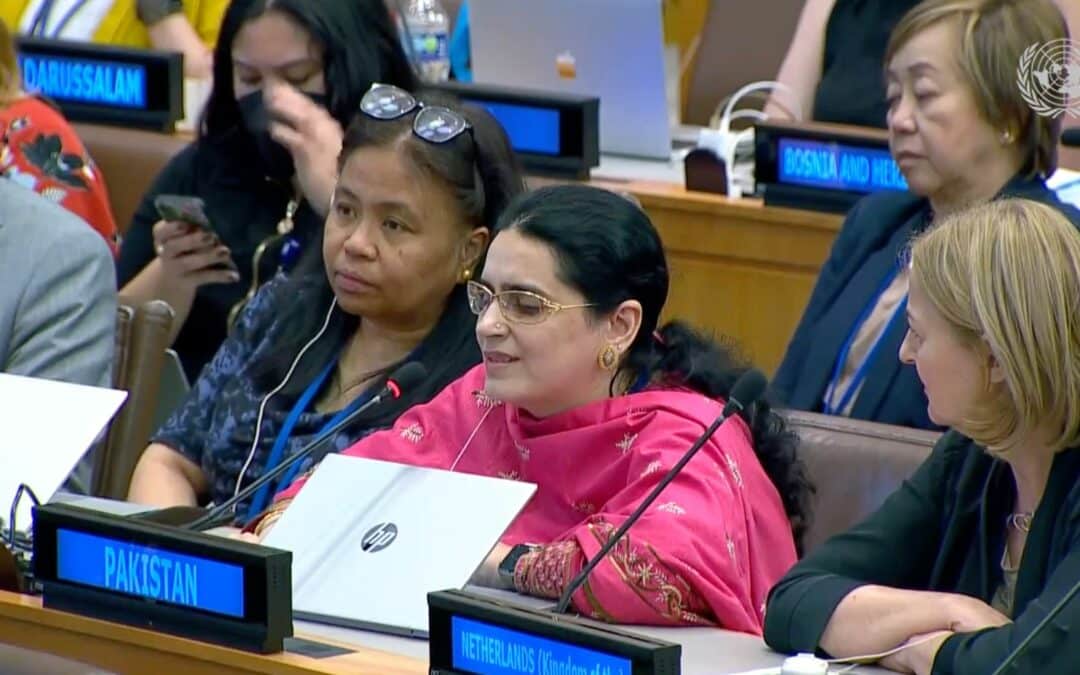Huge Victory at the UN!
Pro-Family Countries Hold their Ground against Western Bullies
On April 14, few people were aware of the intense drama playing out in the halls of the United Nations. The Commission on Population and Development, or CPD, was in its final hours. After more than three weeks of negotiations, at 10:30 pm the night before, the final draft – a Chairman’s text of the “Agreed Conclusions” – had been delivered to all UN delegations. And, some delegations were very unhappy, to put it mildly.
Two days earlier, twenty-two countries had “broken silence,” expressing their concerns about paragraphs contained in a prior text. Yet, the delegations had a new text in front of them with paragraphs they had specifically rejected, and, adding insult to injury, an egregious paragraph that had not been negotiated at all.
That Friday morning, pro-family delegations attending the session were lined up to give a verbal lashing to the Chairman of the negotiations. The Chair, first, attempted to pass the text off as “having consensus” and gavel it down. The pro-family countries were having none of that! For almost three hours, delegates blasted the Chair with comments like this:
- We have a clear red line from our capitals, and we cannot support the text as presented.
- What you are doing here is unprecedented!
- Our suggestions were not included, and some not even discussed! The red line we indicated long before the negotiations – and spoke clearly during negotiations – still remains in the text! Twenty-two countries had to break the silence procedure; we have come to you openly and expressed our position. After that, our positions were not taken into account!
- In addition, the text came to us at 10:30 pm at night! Making it difficult to communicate with our capital. In addition, the text is in English [not the required three main UN languages] and can’t be read easily. This violates the UN Charter’s desire to have multi-lingualism. This damages the credibility of this Commission.
- The text should be circulated for 24 hours before consideration. This is just not an option, now. The text has been circulated contravene the rules. We request that the text be withdrawn. The standards have not been met!
As mentioned earlier, this went on for almost three hours, with country after country making a statement against the text. They made their case, primarily, by citing “procedural” missteps, which proved to be an effective strategy.
Yes, there were the usual anti-family delegations (U.S., Canada, Australia, Germany, France, UK, Netherlands, Denmark, Sweden, etc.) who spoke in support of the text and accused the approximately 27 countries who spoke against it of being unreasonable, uninformed on procedures, not caring about women, and of “ambushing” this year’s CPD negotiations. But their case was clearly contrived and weak.
Why the concern?
Much anger and distrust centered around the newly added paragraph (OP 16) which referenced a concept known as Comprehensive Sexuality Education (CSE). CSE programs seek to change society by changing sexual and gender norms. These programs promote acceptance of diverse sexual identities and orientations and has an almost obsessive focus on teaching children about techniques for “sexual pleasure.” But pro-family countries refused to accept ambiguous terminology on CSE as “agreed” language.
These delegations spoke of how the negotiations had been derailed by a “fixation” on one part of education, sexuality education, when much of the world is struggling to provide basic education, internet, and technology (education being the theme of this year’s CPD). They pointed out it wasn’t the UN’s role to force a particular type of education (CSE) upon other nations when it stood in conflict with their countries’ religious values and morals, especially when many don’t even have basics like food, clean water, and sanitation. “We’ve failed millions upon millions of children,” declared one delegate.
A surprising finish
Shocking many, as the afternoon session began, the Chairman withdrew the text. There would be no outcome document! The Chair was wise enough to see that there was no future for the text as it stood – and there was no time to negotiate a new one. The Chair knew the pro-family delegations had had enough of the manipulation and efforts to ignore or silence them. The final two hours of the afternoon session were filled with observations of how delegations viewed the negotiation process, with traditional countries addressing how some countries’ efforts to force a sexual agenda upon the world, particularly at this Commission, was harmful, even shameful.
One delegate’s powerful statement encapsulated the problem:
“It is regretful that this process was derailed because of an inordinate focus on issues related to sexual and reproductive health and reproductive rights and sexuality education. In this regard, we express our concern on the language of comprehensive education on human sexuality. Sexuality education is one of the most divisive topics in this and other UN fora. While understanding it is a priority for some delegations, we make the following points: 1) There is no right to sexuality education in international law; it is not numerated in any treaty. 2) It may not be read into a general right to education. 3) States have no obligation to adopt any particular program of education.
This is in clear contrast to the rights of parents with regard to their children’s education which are, instead, enshrined in international law.” [See a list of the internationally-agreed parental rights language, below.]
Thanks to all who spoke boldly for The Family
UFI is pleased that we were able to assist the pro-family delegations by providing analysis of the drafts of the text, as they became available, including sending pro-family delegations three different CPD language-specific grids that provided paragraph by paragraph help in navigating the various versions of the text.
United Families wishes to express gratitude to those courageous countries who joined together and spoke up, saw the games that were being played against them, and refused to be bullied. They put to rest a very bad UN outcome document. The families of the world owe them a debt of gratitude, too!
 May the pro-family successes continue,
May the pro-family successes continue,
Wendy Wixom, President
United Families International
Parental Rights in Education – Internationally Agreed Language
“Parents have a prior right to choose the kind of education that shall be given to their children.” (Universal Declaration of Human Rights, Article 26.3)
“Acknowledge and promote the central role of families, parents and other legal guardians in educating their children and shaping their attitudes . . . .” (Further Implementation of the Programme of Action of the International Conference on Population & Development – Cairo +5, 73-d)
“Recognizing the rights, duties and responsibilities of parents and other persons legally responsible for adolescents to provide, in a manner consistent with the evolving capacities of the adolescent, appropriate direction and guidance in sexual and reproductive matters . . . .” (International Conference on Population & Development – ICPD, 7.45)
“The family has the primary responsibility for the nurturing and protection of children from infancy to adolescence. Introduction of children to culture, values and norms of their society begins in the family. (World Declaration on the Survival, Protection & Development of Children – Children’s Summit, 18)
“…Parents or, as the case may be, legal guardians, have the primary responsibility for the upbringing and development of the child. (Convention on the Rights of the Child, Article 18-1)
“With due respect for the rights, duties and responsibilities of parents and in a manner consistent with the evolving capacities of the adolescent, and their right to reproductive health education, information and care, and respecting their cultural values and religious beliefs. . .” (Further Implementation of the Programme of Action of the International Conference on Population & Development – Cairo +5, 73-e)
The primary responsibility for the protection, upbringing and development of children rests with the family. All institutions of society should respect children’s rights and secure their well-being and render appropriate assistance to parents,…” (Special Summit on Children – Children Summit +10, 15)

